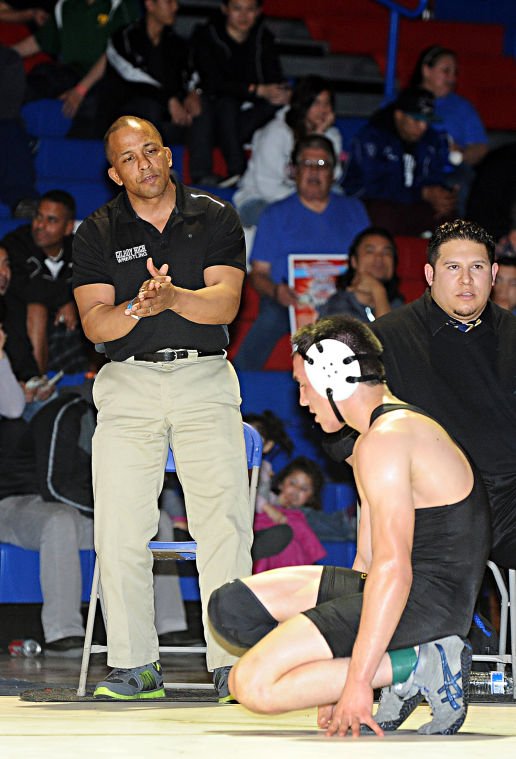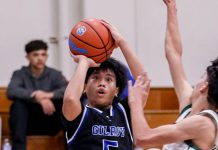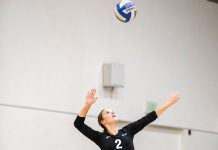
Sports have the power to transform a life.
Before started wrestling, Gilroy High Principal Dr. Marco Sanchez’s was headed down a very different path. Wrestling, however, allowed him to be the first in his immediate family to graduate from high school and gave him an opportunity he never thought he’d have — receiving a scholarship to Arizona State University. From there, he continued to push himself, until he achieved his ultimate goal —becoming an Olympian.
Below Dr. Sanchez talks about his experience in his own words:
Talk to me about your journey to the 1996 Olympic Games in Atlanta:
Dr. Marco Sanchez: This just didn’t happen in 1996. It was a 12 year journey starting with me watching the 1984 Olympics as an 8th grader and my coaches mentioning to me that maybe someday you could be there. That kind birthed the dream to do everything I could to get there. That includes doing well in school, going to a major university and doing well there and competiting beyond that. I pointed everything in that direction.
Would you say this was the pinnacle of your wrestling career?
MS: I would say it was, yeah. There were some stepping stones to get there that were really memorable: Winning a state title, winning a national title. Actually qualfying for the Olympics was tough also because you had to go to a regional qualifier — the Pan-Am Championships, Pan America Championships which is North and South America and you had to place in the top four. Punching your tickets to the games was a challenge and I was doing that while working full time as a teacher and being a dad and husband. I was a family man and I was working and training, so it was a lot.
That’s a lot for anyone to juggle, let alone someone training for the Olympics. How did you do it?
MS: I had a very understanding employer. I had a lot of support from the community and I had a good training environment. I could travel when needed and go to major competitions in Europe and South Amercia and Asia in preparation. I spent a considerable amount at the Olympic Training Center in Colorado Springs.
The world always tunes in for the Opening Ceremonies. What was it like actually being there?
MS: It was pretty phenominal sitting in 1996 at the Olympic Opening Ceremonies and being around the Dream Team and world class athletes — 10,000 I think were at that Olympics — and being on the world stage. It was amazing. You had world leaders there from all over the globe and 200 countries over 14 days. It was pretty amazing.
I think all athletes get nervous right before it’s their time to shine. Was that pressure magnified on the Olympic stage?
MS: It was very intimidating, I have to be honest with you. The Opening Ceremonies were the night before and by the time you got out of there with all the traffic and everything it was 2 o’clock in the morning by the time we got back to the Olympic Village. Our weigh-ins were at 9 o’clock that same morning.
I was tired, I was very nervous. I found that most Olympians don’t go to the Opening Ceremonies — a lot of the veteran ones — especially if they have their event the next day. I kind of missed the memo, the fax, that day. It was a long morning. Greco Roman wrestling was the first two days of the Games which was awesome because then you could enjoy the next 12 days. That was really nice.
What was the most memorable part — or parts — of the experience for you?
MS: The Opening Ceremonies, the competition was tough. I finished 15th out of 23 countries that were in my weight class, so right in the middle. I had one close match that will always stick in my mind that I lost in overtime by a 6-5 margin, had I won I would’ve placed higher. Just going to the match, hearing your name called, you’re on deck and you’re waiting for Russia and Korea to finish up and you’re right there, you’re coming up. Just the whole experience and just being around high level athletes, just the intensity and the pagentry — the ceremony of the medals. It’s pretty cool. You watch it on TV for so long and then you’re there and you’re part of it — not as a spectator, but your name is on the bracket. You’re stepping on the mats and you’re competiting.
Was there any challenges you faced or any competitor that still sticks out in your mind?
MS: I did injure my finger on my right hand severely, the middle finger was dislocated. It’s crooked to this day. I just taped it up, it was like two days before the Games. I taped it up and went out there and went for it. It got grabbed quite a bit, it was like a target.
How were you feeling when wrestling, one of the original Olympic sports, was removed from the Games a couple years ago?
MS: The IOC — the International Olympic Comittee — had a temporary lapse in sanity. I’m glad that they took their meds and came to the light and said ‘Hey, this is an original Olympic sport’ and it’s been reinstated. I felt really good about that. It worried me for a minute there and the wrestling committee in general, but I knew they would reinstate it.
Gilroy High has a history for producing stellar wrestlers and this year is no different. As an assistant coach, are there any current Mustangs you think might follow in your footsteps one day?
MS: The wrestlers that I see, that I have the priviledge and honor of working with, they’re a lot better than I was. They’re a lot better. I’m not kidding you. I started relatively late compared to these guys. These kids, like Nikko Villarreal who’s our state champ and Paul Fox, have been wrestling since they were four and have been successful at every level. I came in as a sixth grader at the age of 12 and only wrestled in maybe 10 matches a year my first two years. I didn’t really get that experience until my eighth grade year. These guys are coming in with 60 matches a year for seven or eight years in a row. They’ve got a lot more mat time, a lot more experience and they’re just flat out way better than I ever could’ve hope to have been at their level.
I think what gets you to the next level though is your desire to improve. You get into the college pool level and you’ve got dozens of state champions, dozens of national champions that have been successful. What’s going to seperate you from them? At that point, it’s your desire to take it to the next level. When I graduated from college, I thought ‘I really don’t have to do this. I could just hang my shoes up. I’ve done well. I could be satisfied with my accomplishments,’ but I wanted to do more. I wanted to get to that next level and you have to make sacrifices. You have a family, you’re working and you still have to find time to train. I think that’s what seperates any competitor from any average, normal competition. Yes, we do have a few on our current season’s squad that could definitely, if they wanted to, go to that next level and I wouldn’t be surprised.
Maybe GHS alum Jesse Delgado, who was a Division I champion for the University of Illinois last season?
MS: He’s blazing a path and he’s going to be a hard act to follow. We have four going to a Division I school this year which is amazing.
So where did this love of wrestling come from?
MS: It was the wrestling coach at the middle school who kind of grabbed me by the ear and pulled me into the wrestling room after I was getting into trouble a lot. He said ‘You think you can fight? Here’s where you the men seperate from the boys.’ He threw me in the wrestling room and I kind of had to fight my way out. I got bit by the wrestling bug.
It was great for me, it rewards aggression and all the hyperactivity I had I could funnel it through an activity. Instead of ending up in the principal’s office, I ended up getting awards and medals and acknowledgement for something that became very natural for me. I had a lot of support from coaches and teachers that encouraged me.
And it paid off with a college scholarship.
MS: College just opened up a whole new world. No one in my family ever went to college, no one in my immediate family graduated from high school. I was actually the first in my family to graduate from high school. College and university wasn’t even in our vocabulary, they were never discussed. So coaches and teacher said ‘Hey you’re college material. You’re university material. You could wrestle, you could get a scholarship. You could have someone pay for your education.’ It just opened a whole world to me.
Next thing you know I had the 1984 Olympic Champion who I saw on television win the championship, Dave Schultz, and the Olympic wrestling coach, Bobby Douglas — Bobby Douglas was the coach at Arizona State and he was also the Olympic coach — at my door recruiting me. He was saying ‘Son, I want you to be a Sun Devil’ and it was just like ‘Wow.’ He’s like ‘Here’s the steps you have to take’ and two months later I was a Sun Devil and signed off and was headed off to college.
So it changed your life?
MS: It changed my life. I was not going down the right path, let’s put it that way. The sport was a life changing experience for me. The Olympics was unfortunately a once in a lifetime experience for me. I was hoping to go back in 2000, but it just didn’t work out that way. I just enjoyed the time there and being an Olympian. …To be counted among those Olympians was something I never thought I would obtain, but I did. I just thank God for it.














